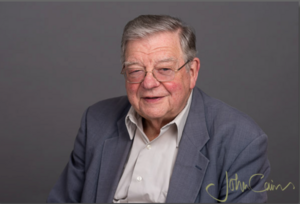Events
Nov 29, 2024
Seminar (2024-11-29)
School of Biomedical Sciences cordially invites you to join the following seminar:
Speaker: Sir Walter Bodmer, FRCPath, FRS, Head of the Cancer and Immunogenetics Laboratory, Department of Oncology, University of Oxford
Talk Title: Goblet cell differentiation in colorectal cancer: a model for cancer evolutionary progression
Date: 29 November 2024 (Friday)
Time: 4:00 pm – 5:00 pm
Venue: Lecture Theatre 1, G/F, William M.W. Mong Block, 21 Sassoon Road
Host: Professor Kathryn Cheah
Biography

Following a BA in mathematics, and a Ph.D. in population genetics under Sir Ronald Fisher, at Cambridge University I did post-doctoral work under Joshua Lederberg at Stanford. I was on the faculty of the Genetics Department in the Stanford University Medical School from 1962 until 1970, eventually as Full Professor and returned to England in 1970 as Professor of Genetics at Oxford University. In 1979 I became Director of Research, and later Director General, of the Imperial Cancer Research Fund. In 1974 I was elected a Fellow of the Royal Society, an International Member of the US National Academy of Science in 1981 and Knighted in 1986. In 2013 I was awarded a Royal Medal from the Royal Society "for seminal contributions to population genetics, gene mapping and understanding of familial genetic disease." My current major research interests are in the fundamental genetics and biology of colorectal cancer and their potential applications.
Abstract
The poor prognosis of undifferentiated cancers has long been recognised, suggesting that selection against differentiation is one of the most powerful drivers of cancer progression. We have shown that colorectal cancer (CRC) cell lines fall into 5 categories based on their levels of MUC2 and TFF3 expression, key markers of goblet cell function, and that these 5 patterns of expression can be identified in the direct analysis of tumour specimens. About 30% of all CRCs fall into the novel category of expressing TFF3 but not MUC2. The data indicate that there are up to 12 genes that may be involved in selection against goblet cell differentiation in CRC by changes in methylation rather than mutations. This suggests that the future search for driver genetic changes should be based mainly on studying gene expression control by methylation and DNA coded functional RNAs, rather than just mutations in protein coding genes.
ALL ARE WELCOME.

